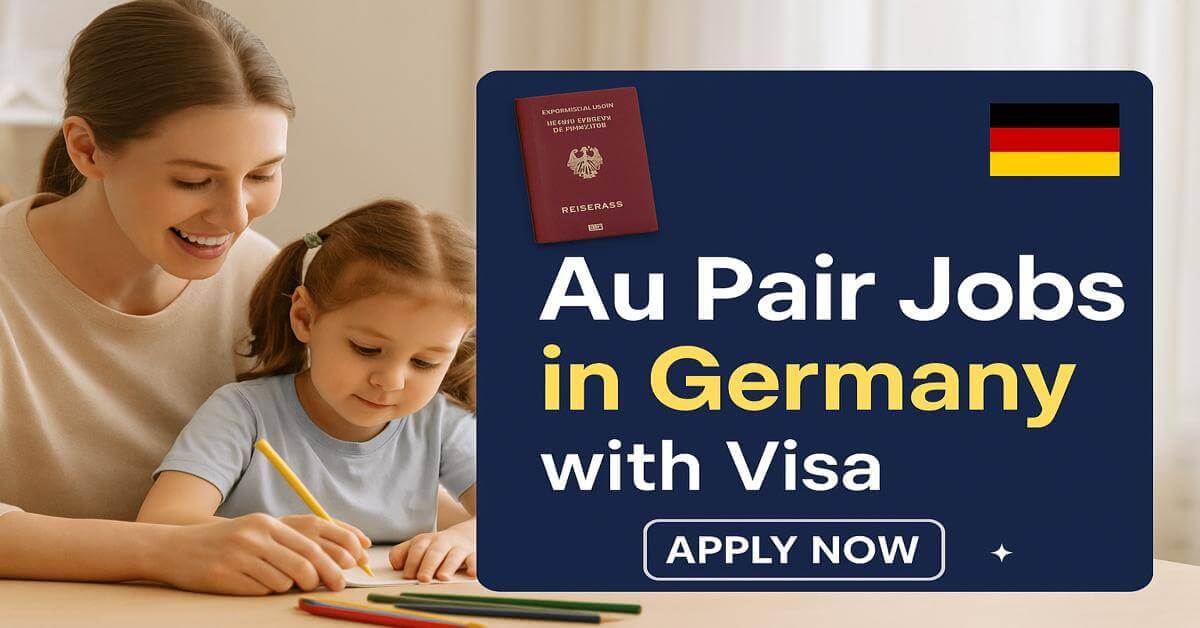Looking for an unforgettable experience abroad? Living in Germany as an au pair with visa sponsorship allows you to grow personally and professionally while being part of a welcoming family. With full-time, on-site work, and a monthly salary of 500 to 800 EUR, this role is perfect for those with 2 to 3 years of childcare experience who are eager to explore German culture in 2026.
You’ll assist with school runs, homework, playtime, and light household tasks, all while enjoying free accommodation, meals, and opportunities to improve your language skills.
Job Details:
| Location | Germany |
| Job title | Au Pair Jobs in Germany with Visa |
| Education | High School Diploma |
| Experience | 2-3 Years |
| Visa Sponsorship | Yes |
Intoduction:
An au pair is a young person, typically aged 18 to 30, who lives with a host family in Germany to provide childcare and help with light household duties. In return, the au pair receives free accommodation, meals, a monthly stipend, and the chance to immerse themselves in German culture and language.
Visa Sponsorship for Au Pair Jobs in Germany:
To legally work as an au pair in Germany, most international candidates need a cultural exchange visa. Visa sponsorship means the host family or agency assists you in obtaining this visa, ensuring you have the necessary legal documentation to stay and work in Germany.
Key visa requirements:
- Age between 18 and 30 years.
- Basic German or English language skills.
- Health insurance coverage.
- Valid au pair contract with a host family.
- No prior long-term stay in Germany as an au pair.
Check Also: Primary Teaching Jobs in Luxembourg with Visa
Types of Au Pair Jobs in Germany:
There are several variations of au pair roles depending on family needs:
- Conventional Au Pair: This involves the care of their children, residing within the host family’s social circle, and assisting with minor household responsibilities. Visa sponsorship may be an inherent component of conventional Au Match arrangements.
- Au Pair Dialect Guide: Additionally, a few families seek an au pair to assist their children in developing their language skills, particularly in English.
- Summer Au Match: Families may employ an au pair during the summer months when their children are not attending school. This could be implemented to promote outdoor activities and excursions.
- Educational Au Combine: Additionally, families may require an Au Combine with a background in education to aid in mentoring or homeschooling.
- Special requirements for au pairs: Families with children who have specific interests may seek au pairs who have experience caring for children with disabilities or therapeutic issues, or who provide related entertainment.
- Au Combine Social Trade: A few families may also opt for a diverse approach and seek for Au Sets from specific countries in order to expose their children to a variety of dialects and societies.
- Live-in au: A conventional au match is comparable to a live-in au match; however, the latter is more involved in family obligations and is focused on providing full-time daycare.
- Part-time Au Pair: Families with somewhat less unpleasant intentions may also seek a part-time Au Pair to assist with childcare and family responsibilities for a predetermined number of hours per week.
- School-Aged Children: Certain families may be particularly interested in an Au Combine to assist with college application forms in the United States and after-school activities for more experienced children.
- Additionally, families with multiple children may seek au pairs who are enthusiastic about caring for multiple children simultaneously or who are comfortable doing so.
Responsibilities of Au Pair Jobs in Germany:
As an au pair, your typical duties may include:
- Taking children to school or daycare and picking them up.
- Helping with homework and educational activities.
- Organizing playtime, reading, and creative activities.
- Preparing light meals and snacks for children.
- Assisting with bathing, dressing, and bedtime routines.
- Performing light household chores related to children, such as laundry and tidying their rooms.
- Participating in family outings and social events.
Au pairs usually work up to 30 hours per week and are entitled to at least 1.5 consecutive days off per week and 4 weeks of paid vacation per year.
Benefits of Au Pair Jobs in Germany:
- Cultural Immersion and Exchange: Living with a German host family offers a unique opportunity to fully immerse yourself in the local culture, traditions, and daily lifestyle. This firsthand experience helps you gain a deeper understanding of German society and build cross-cultural communication skills.
- Language Learning Opportunities: Most au pair programs encourage participants to learn or improve their German language skills. Many families or agencies include access to language courses, helping you become more fluent while practicing daily with native speakers.
- Free Accommodation and Meals: Your host family provides a private room, meals, and a comfortable living environment. This significantly reduces your living expenses, allowing you to save money or spend on travel and personal activities.
- Monthly Stipend: In addition to accommodation and meals, au pairs receive a monthly allowance or pocket money. This stipend helps cover personal costs such as transportation, leisure, and other daily needs.
- Balanced Work Hours and Time Off: Au pairs typically work up to 30 hours per week with a maximum of 6 hours per day, ensuring a healthy work-life balance. You are also entitled to regular days off, public holidays, and paid vacation time.
- Travel and Exploration: With weekends and holidays off, you have plenty of opportunities to explore not only Germany but also neighboring European countries, making your au pair experience an adventurous and enriching one.
- Legal Visa Sponsorship and Support: The host family or agency typically provides visa sponsorship, enabling you to live and work legally in Germany. This support includes guidance through visa applications and necessary documentation.
- Valuable Childcare and Life Skills: Working as an au pair helps you develop important skills such as childcare, responsibility, time management, and problem-solving, which are valuable for personal growth and future career opportunities.
- Building Lifelong Relationships: Living with a family allows you to form strong emotional bonds and friendships that can last a lifetime. You also get to meet other au pairs and locals, expanding your social network internationally.
- Pathway to Future Opportunities: An au pair stay in Germany can be a stepping stone to further education, internships, or job opportunities in Germany or elsewhere in Europe, especially if you improve your language proficiency and cultural understanding.
Eligibility Requirements for Au Pair Jobs in Germany:
To qualify for an au pair position with visa sponsorship, you should:
- Be aged between 18 and 30.
- Have basic proficiency in German or English.
- Have a genuine interest in childcare and experience (formal or informal) with children.
- Be willing to assist with light household duties.
- Possess health insurance coverage.
- Have a clean criminal record.
- Commit to a stay of typically 6 to 12 months.
How to Apply for Au Pair Jobs in Germany with Visa?
- Search for Host Families or Agencies: Use trusted platforms like AuPairWorld, AuPair.com, or specialized agencies that assist with placements and visa sponsorship.
- Prepare Your Application: Create a detailed profile or CV highlighting your childcare experience, language skills, and motivation to be an au pair.
- Secure a Host Family: Interview with potential families and agree on duties, working hours, and stipend.
- Sign a Contract: A formal au pair agreement outlining responsibilities, working hours, stipend, vacation, and accommodation is essential.
- Apply for Visa: With your signed contract, apply for the cultural exchange visa at the German embassy or consulate in your country. Your host family or agency often assists with this process.
- Prepare for Departure: Arrange health insurance, accommodation details, and travel plans.
- Arrival and Integration: Upon arrival, participate in cultural orientation and language courses offered by some agencies or families.
Additional Information:
- Always verify the legitimacy of the host family or agency before committing.
- Beware of scams promising jobs without formal contracts or visa sponsorship.
- Understand your rights as an au pair, including maximum working hours and minimum rest periods.
- Keep copies of all documents and correspondence related to your au pair stay.
Conclusion:
Starting an au pair journey in Germany with visa sponsorship is a unique chance to grow, explore, and connect with a new culture. You’ll gain valuable childcare experience, improve your language skills, and enjoy support from a welcoming host family. With a stipend, free accommodation, and time to travel, this role offers both personal growth and unforgettable memories.
Frequently Asked Questions:
-
What kind of duties does an au pair perform?
Typical duties include childcare (babysitting, helping with homework, school runs), light housework related to children (laundry, tidying), and cultural exchange activities.
-
Who is eligible to apply for an au pair job in Germany?
Candidates must be aged 18 to 30, have basic German or English language skills, and a genuine interest in childcare. Health insurance and a clean criminal record are also required.
-
What visa do I need to work as an au pair in Germany?
You will need a cultural exchange visa (Au Pair visa), which allows you to live and work with a German host family for up to 12 months.






